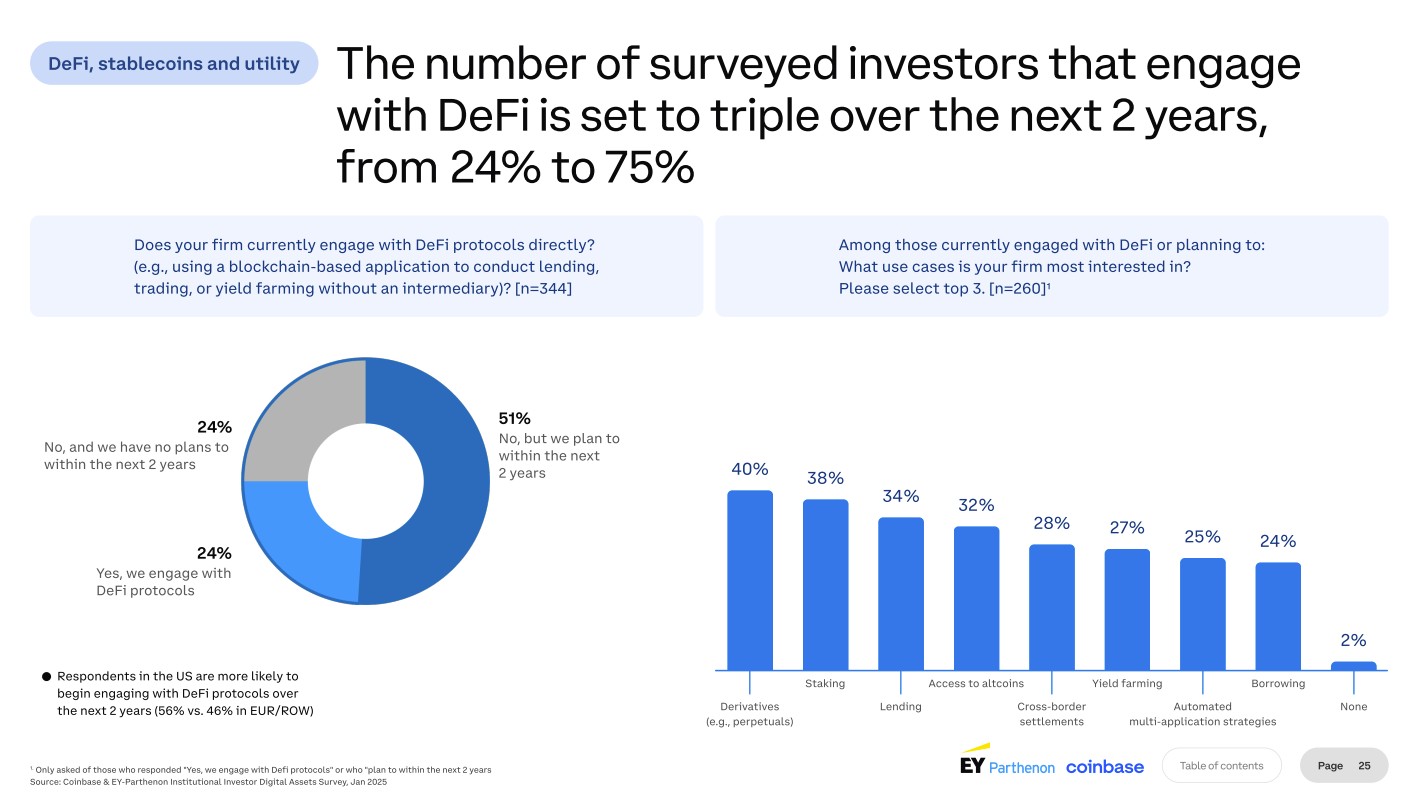- The survey was carried out in January during the peak of Bitcoin’s historic high of $109,000.
- 59% of institutional investors plan to allocate more than 5% of their assets under management to digital assets.
- Additionally, 75% of respondents expressed intentions to invest in some form of tokenization by 2026.
Institutional investors continue to show optimism in the crypto market, with 83% planning to increase their cryptocurrency exposure by 2025.
The study, involving 352 institutional decision-makers, was conducted by Coinbase and EY-Parthenon.
The findings revealed that “over three-quarters of the investors surveyed anticipate boosting their allocations to digital assets by 2025, with 59% planning to invest over 5% of their assets under management into digital assets or related products.”
Conducted at the time of Bitcoin’s record high of $109,000, the survey indicated that nearly 80% of investors expect an increase in crypto prices, while around 70% view cryptocurrency as the most promising avenue for generating attractive risk-adjusted returns.
Growth in Stablecoins and DeFi
There is a growing interest in stablecoins, with 84% of institutions either currently utilizing or planning to utilize stablecoins this year. Furthermore, 75% intend to invest in some form of tokenization by 2026.
In terms of decentralized finance (DeFi), the proportion of investors expected to engage with it is projected to increase from 24% to 75% over the next two years. However, challenges remain, including regulatory (57%) and compliance (55%) issues, as well as a lack of internal expertise (51%), as highlighted in the survey.

Among those currently involved in or planning to engage with DeFi, the most sought-after use cases include derivatives (40%), staking (38%), and lending (34%).
The Need for Regulatory Clarity
Institutional investors perceive regulation as both the greatest opportunity and the biggest risk within the crypto market for 2025.
The survey suggests that establishing clearer regulations regarding custody, tax implications, and the use of stablecoins could attract new market participants and stimulate activity.
According to the researchers, “We anticipate that the positive stance and actions from both the new US administration and global regulatory bodies will further accelerate the growing interest in digital assets.”
Since the survey was completed, cryptocurrency prices have dipped. As of this publication, Bitcoin is trading at approximately $83,000, having previously fallen to $76,000 earlier this month following a statement from US President Donald Trump, who did not rule out a potential recession.
This post originally appeared on CoinJournal.
In January, during a peak period when Bitcoin reached its all-time high of $109,000, a pivotal survey was conducted by Coinbase and EY-Parthenon targeting institutional investors. The survey, which involved 352 decision-makers from the institutional landscape, unveiled a significant bullish sentiment towards digital assets among these investors.
The survey indicated that 59% of institutional investors are planning to allocate more than 5% of their assets under management into digital assets, reflecting a strong commitment to entering or expanding their presence in the cryptocurrency space. Furthermore, an impressive 83% of the respondents expressed intentions to increase their crypto investment exposure by 2025, with 76% of respondents anticipating that this allocation will elevate, underscoring a prevailing optimism surrounding the future of cryptocurrencies.
Moreover, the enthusiasm extends beyond Bitcoin, as approximately 80% of investors expect a rise in crypto prices moving forward. A significant 70% view cryptocurrencies as one of the most promising avenues to achieve attractive risk-adjusted returns, highlighting the growing acceptance of digital assets within institutional portfolios.
The survey also illuminated a noteworthy trend in the adoption of stablecoins and decentralized finance (DeFi). A staggering 84% of the institutions surveyed either currently use or plan to utilize stablecoins within this year, which are regarded as a bridge between traditional finance and the burgeoning crypto market. Additionally, the interest in tokenization is forecasted to mirror this trajectory, with 75% of participants indicating intentions to invest in some form of tokenization by 2026.
The DeFi sector appears set for expansive growth as well, with engagement projected to increase from 24% to an impressive 75% of investors over the next two years. Among those currently involved in or planning to enter the DeFi space, the most appealing use cases include derivatives (40%), staking (38%), and lending (34%). However, despite the optimistic views surrounding DeFi, the survey noted that considerable barriers persist. Regulatory concerns top the list, with 57% of respondents identifying regulatory uncertainties as a major hindrance, closely followed by compliance concerns at 55% and a lack of internal knowledge at 51%.
Interestingly, the survey respondents perceive regulation as both a significant risk and a prime opportunity for the future of the crypto market. Many believe that introducing comprehensive regulatory clarity—particularly regarding custody, tax treatment, and stablecoin usage—will help attract new market participants and enhance overall activity in the digital asset space. The researchers underscored the potential for a positive shift in sentiment and regulatory action, particularly with the evolving landscape in the United States and globally, which could further fuel interest in digital assets.
However, it’s important to contextualize the timing of the survey results with the subsequent fluctuation in crypto prices, as Bitcoin has seen a decline from its record high. At the time of the report’s publication, Bitcoin was trading around $83,000, having dipped to $76,000 earlier in the month amid economic concerns highlighted by US President Donald Trump’s comments hinting at potential recession risks.
Overall, the survey paints a picture of an evolving landscape where institutional interest in digital assets is robust and growing, albeit with challenges to navigate. The projections for future involvement in cryptocurrencies, stablecoins, and DeFi signal an enduring belief in the sector’s potential, despite existing barriers and recent market volatility. This sentiment towards crypto indicates that institutional investors are gearing up to embrace the next phase of the digital asset revolution.
